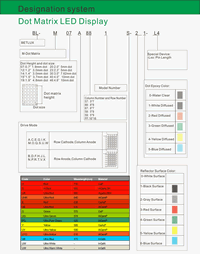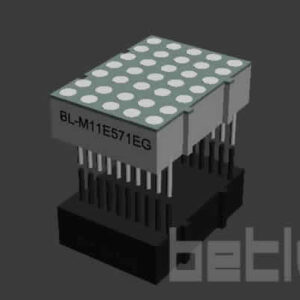3.0 inch height 5×7 LED dot matrix, bi-color
Series No:
Weight:(g/pcs)
Dimension:(mm)
Dot height:(mm)
Dot pitch:(mm)
Dot size:(mm)
Specification:
Inquiry
Description:
Introduction
In the rapidly evolving world of display technology, the dot matrix 5×7 stands out as a versatile and efficient solution, especially when enhanced with bi-color capabilities. This article explores the integral features, applications, and benefits of the 3.0 inch height 5×7 LED dot matrix, bi-color, shedding light on its transformative impact in the electronics industry.
Key Features of the 3.0 Inch Height 5×7 LED Dot Matrix, Bi-Color
The 3.0 inch height 5×7 LED dot matrix utilizes two different light-emitting diode colors within the same unit, offering enhanced visual communication through a compact display. The typical wavelengths for bi-color matrices include combinations like red and green, where each LED can emit both colors, but a 470nm wavelength for blue is also common, adding a vibrant contrast and more display options.
Technical Specifications:
- Resolution and Precision: Each matrix consists of 35 LEDs in a 5×7 grid, allowing detailed and varied display patterns.
- Dual-Color Flexibility: Each LED can switch between two colors, which is ideal for status indicators or messages that require attention differentiation.
- Ease of Programming: Integration with systems via simple control interfaces, often using PCB with LED technology, ensures that these matrices are both versatile and easy to use.
Applications in Electronics
The dot matrix 5×7 is widely adopted in various electronics applications ranging from consumer electronics interfaces to industrial warning systems. Its ability to convey information effectively makes it suitable for:
- Public Information Displays: Such as transport signs and queue management systems in banks or hospitals.
- Consumer Electronics: Including set-top box displays, gaming consoles, and portable meter readings.
- Industrial Control Panels: Where reliability and clarity under different lighting conditions are paramount.
Advantages for Stakeholders
Electronics manufacturers, engineers, and administrators benefit significantly from incorporating the bi-color dot matrix into their projects:
- Enhanced User Experience: The ability to display multiple colors enhances user interface intuitiveness and aesthetics.
- Reduced Power Consumption: LEDs are energy efficient, and the ability to convey more information per pixel can reduce the number of LEDs needed, further saving energy.
- Reliability and Durability: LEDs offer a long lifespan and can operate under a wide range of environmental conditions, making them ideal for both indoor and outdoor applications.
Case Studies and User Testimonials
Case Study: Traffic Management System
A city implemented a traffic signal system using the 3.0 inch height 5×7 LED dot matrix to display real-time updates and alerts. The dual-color functionality allowed for clear and immediate communication of changes and warnings, improving traffic flow and reducing congestion during peak hours.
Testimonial from the City Traffic Engineer: “We’ve seen a noticeable improvement in traffic management with the LED matrices. Their durability and clear visibility have made a significant difference in how drivers perceive and react to instructions.”
User Testimonial: Consumer Electronics Manufacturer
“We integrated the bi-color dot matrix into our latest home appliance line. The feedback from users about the clarity and attractiveness of the display has been overwhelmingly positive. It has truly set our products apart in a competitive market.”
Conclusion
The 3.0 inch height 5×7 LED dot matrix, bi-color offers a blend of technology and versatility that can revolutionize the way information is displayed across various industries. Its adaptability and efficiency make it a top choice for manufacturers aiming to enhance the user experience and operational effectiveness.
Call to Action: Elevate your electronic displays by adopting the versatile and efficient 5×7 bi-color LED dot matrix today!

Features
- 3.0-Inch Matrix Height (76.20mm): Offers clear visibility for displays, ideal for applications requiring a medium-sized visual impact.
- Dot Size: 7.62mm, Circle Dot: Large, circular dots for clear visibility and aesthetic appeal.
- Column and Row Configuration: 5 Columns x 7 Rows: A matrix of 35 individual dots provides flexibility for displaying various symbols or characters.
- Dimensions (Width x Height): 56.90 x 79.80mm: Efficient dimensions for effective display while maintaining space efficiency.
- Bi-Color Selected: Ability to display in two different colors, enhancing the display’s versatility and visual appeal.
- Low Current Operation: Energy-efficient, suitable for both battery-powered and low-power electronic devices.
- High Contrast and Light Output: Ensures excellent readability in diverse lighting conditions.
- Compatible with ASCII and EBCDIC Code: Can display a broad range of characters and symbols, increasing utility.
- Stackable Horizontally: Allows for expanding the display area by aligning multiple units side by side.
- Column Cathode and Column Anode Available: Offers flexibility in electronic design for various circuit integrations.
- Easy Mounting on P.C. Boards or Sockets: Straightforward installation, facilitating efficient integration into electronic systems.
- Categorized for Luminous Intensity: Consistent brightness levels across units for uniform display quality.
- Technically Rugged: Durable and reliable, capable of enduring various operational environments.
- Standard Design: Gray Surface and White Dot: Visually appealing with high contrast for readability.
- RoHS Compliance: Meets environmental safety standards.
Applications
- Public Information Displays: Suitable for large, visible information displays in airports, stations, or event venues.
- Advertising and Retail Signage: Ideal for eye-catching displays in retail settings or for advertising purposes.
- Industrial Displays: Appropriate for displaying data, status messages, or alerts in industrial environments.
- Scoreboards and Event Timers: Useful in sports stadiums or event spaces for visible scoring or timing displays.
- Interactive Kiosks: Can be integrated into information kiosks in public areas, museums, or exhibitions.
- Educational Displays: Beneficial in educational settings for large visual aids or instructional content.
- Healthcare Signage: Suitable for displaying patient information or alerts in hospitals and clinics.
- Safety and Emergency Signage: Appropriate for displaying safety alerts, warning messages, or directional signs.
- Transportation System Displays: Effective in showing route numbers, schedules, or updates in transportation networks.


Electrical-optical characteristics:
Part No.(Row Cathode) | Part No. (Row Anode) | Color | Material | Peak Wavelength (nm) | Voltage typ. (v) | Voltage Max. (v) | Luminous Min. | Luminous typ. |
|---|---|---|---|---|---|---|---|---|
BL-M30A571DUG (D) |
BL-M30B571DUG (D) |
Ultra Red |
AlGaInP |
660 |
2.5 |
160 |
||
BL-M30A571DUG (UG) |
BL-M30B571DUG (UG) |
Ultra Green |
AlGaInP |
574 |
2.5 |
190 |
||
BL-M30A571EG (E) |
BL-M30B571EG (E) |
Orange |
GaAsP/GaP |
635 |
2.5 |
110 |
||
BL-M30A571EG (G) |
BL-M30B571EG (G) |
Green |
GaP/GaP |
570 |
2.5 |
125 |
||
BL-M30A571EG |
BL-M30B571EG |
Orange |
GaAsP/GaP |
635 |
5 |
68 |
110 |
|
BL-M30A571EG |
BL-M30B571EG |
Green |
GaP/GaP |
570 |
5 |
70 |
125 |
|
BL-M30A571SG (G) |
BL-M30B571SG (G) |
Green |
GaP/GaP |
570 |
2.5 |
125 |
||
BL-M30A571SG (S) |
BL-M30B571SG (S) |
Super Red |
AlGaInP |
660 |
2.5 |
140 |
||
BL-M30A571SG |
BL-M30B571SG |
Hi Red |
GaAlAs/SH |
660 |
4.2 |
90 |
140 |
|
BL-M30A571SG |
BL-M30B571SG |
Green |
GaP/GaP |
570 |
5 |
70 |
125 |
|
BL-M30A571UEUG (UE) |
BL-M30B571UEUG (UE) |
Ultra Orange |
AlGaInP |
630 |
2.5 |
150 |
||
BL-M30A571UEUG (UG) |
BL-M30B571UEUG (UG) |
Ultra Green |
AlGaInP |
574 |
2.5 |
190 |
Package configuration & Internal circuit diagram
Partno description:
More Information
Reflector Surface color (1st number)/ dot Lens color (2nd number):
| Number | 0 | 1 | 2 | 3 | 4 | 5 |
| Ref Surface Color | White | Black | Gray | Red | Green | |
| Dot Epoxy Color | Water clear | White diffused | Red Diffused | Green Diffused | Yellow Diffused |
Absolute maximum ratings (Ta= 25°C)
| Parameter | S | D | UR | E | Y | G | Unit | |
| Forward Current IF | 25 | 25 | 25 | 25 | 25 | 30 | mA | |
| Power Dissipation Pd | 60 | 60 | 60 | 60 | 60 | 65 | mW | |
| Reverse Voltage VR | 5 | 5 | 5 | 5 | 5 | 5 | V | |
| Peak Forward Current IPF (Duty 1/10 @1KHZ) | 150 | 150 | 150 | 150 | 150 | 150 | mA | |
| Operation Temperature TOPR | -40 to +80 | °C | ||||||
| Storage Temperature TSTG | -40 to +85 | °C | ||||||
| Lead Soldering Temperature TSOL | Max.260+ 5°C for 3 sec Max. ( 1.6mm from the base of the epoxy bulb) | °C | ||||||
Absolute maximum ratings (Ta= 25°C)
| Parameter | UHR | UE | YO | UY | UG | PG | UB | UW | Unit |
| Forward Current IF | 30 | 30 | 30 | 30 | 30 | 30 | 30 | 30 | mA |
| Power Dissipation Pd | 75 | 65 | 65 | 65 | 75 | 110 | 120 | 120 | mW |
| Reverse Voltage VR | 5 | 5 | 5 | 5 | 5 | 5 | 5 | 5 | V |
| Peak Forward Current IPF (Duty 1/10 @1KHZ) | 150 | 150 | 150 | 150 | 150 | 150 | 100 | 100 | mA |
| Operation Temperature TOPR | -40 to +80 | °C | |||||||
| Storage Temperature TSTG | -40 to +85 | °C | |||||||
| Lead Soldering Temperature TSOL | Max.260+ 5°C for 3 sec Max. ( 1.6mm from the base of the epoxy bulb) | °C | |||||||
Related Information
Applied for: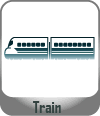

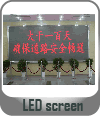
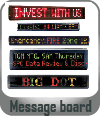

1. Application
The Seven Segment LED is widely applied for ordinary electronic equipment (such as office equipment,
communication equipment and household applications). Checking with BETLUX’s Sales in
advance for information on applications in which exceptional reliability is required, particularly
when the failure or malfunction of the LEDs may directly jeopardize life or health (such as in
aviation, transportation, traffic control equipment, medical and life support systems and safety
devices).
2. Storage
The storage ambient for the Seven Segment LED should not exceed 30℃ temperature or 70% relative humidity.
For extended storage out of their original packaging, it is recommended that the Seven Segment LEDs be stored
in a sealed container with appropriate desiccant, or in a desiccator with nitrogen ambient.
3. Cleaning
Avoid using any unspecified chemical solvent to clean LED . For example, Trichloroethylene, Chlorosen, Acetone, and Diflon S3MC.
Any cleaning method can only be taken under normal temperature in one minute or less if it is required.
Use water to clean the Seven Segment LED if necessary under room temperature
dry it immediately after that.
4.Forming
Any unsuitable stress applied to the epoxy may break bonding wires in LED
Any forming on lead pin must be done before soldering, not during or after soldering.
Avoid applying any stress to resin in order to prevent the epoxy fracture and break on bonding wire.
While forming, please use a tie bar cut or equivalent to hold or bend the pin.
2mm from the base of resin is the minimum distance for the place bending the lead pin.
Avoid bending the lead pin at the same point twice or more.
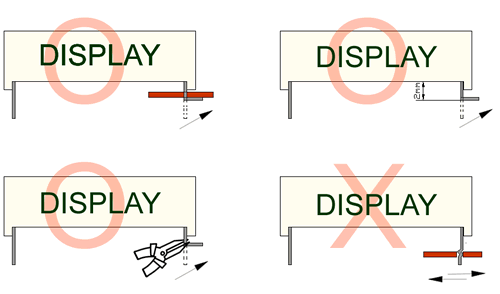
Soldering
When soldering, leave a minimum of 2mm clearance from the base of the base of the lens to the soldering point. Dipping the lens into the solder must be avoided.
Do not apply any external stress to the lead frame during soldering while the LED is at high temperature.
Recommended soldering conditions:
| IR Reflow Soldering (for SMD display) | Wave Soldering | Soldering Iron | |||
| Pre-Heat | 150-180°C | Pre-Heat | 100°C Max. | Temperature | 300°C Max. |
| Pre-Heat Time | 120sec Max. | Pre-Heat Time | 60sec Max. | ||
| Peak Temperature | 260°C Max. | SolderWave | 260°C Max. | Soldering Time | 3sec Max.(one time only) |
| Soldering Time | 10 sec Max. | Soldering Time | 5sec Max. | ||
Note: Excessive soldering temperature and/or time might result in deformation of the LED lens or failure of the LED
ESD(Electrostatic Discharge)
Static Electricity or power surge will damage the LED.
Suggestions to prevent ESD (Electrostatic Discharge):
n Use a conductive wrist band or anti-electrostatic glove when handling these LEDs
n All devices, equipment, and machinery must be properly grounded
n Work tables, storage racks, etc. should be properly grounded
n Use ion blower to neutralize the static charge which might have built up on surface of the LED’s
plastic lens as a result of friction between LEDs during storage and handling
ESD-damaged LEDs will exhibit abnormal characteristics such as high reverse leakage current,
low forward voltage, or “no light on” at low currents. To verify for ESD damage, check for “light on”
and Vf of the suspect LEDs at low currents.
The Vf of “good” LEDs should be>2.0V@0.1mA for InGaN product and >1.4V@0.1mA for AlInGaP
product.

LED dirve IC by Maxim Integrated
MAX6959 4½-Digit LED Display Driver
MAX6958 4½-Digit LED Display Driver
MAX6955 7-, 14-, 16-Segment LED Display Driver
MAX6956 LED Static Display Driver and I/O Port
MAX6954 7-, 14-, 16-Segment LED Display Driver
MAX6952 5 x 7 Matrix LED Display Driver
MAX6957 LED Static Display Driver and I/O Port
MAX6950 5-Digit LED Display Driver
MAX6951 8-Digit LED Display Driver
ICM7212 4-Digit LED Driver
ICM7212A 4-Digit LED Driver
ICM7212AM 4-Digit LED Driver
ICM7212M 4-Digit LED Driver
ICM7218A 8-Digit LED Driver
ICM7218B 8-Digit LED Driver
ICM7218C 8-Digit LED Driver
ICM7218D 8-Digit LED Driver
MAX7221 8-Digit LED Display Driver
MAX7219 8-Digit LED Display Driver
When selecting power for LED systems, it’s essential to understand several key parameters to ensure safe operation, longevity, and optimal performance. Here are some steps and considerations for LED power selection:
- Determine the Forward Voltage (Vf) of the LED(s):
Each LED has a forward voltage, which is the voltage at which the LED operates when the current is flowing through it. This value can typically be found in the LED’s datasheet.
- Determine the Forward Current (If) of the LED(s):
The forward current is the current at which the LED is designed to operate. Running an LED at higher than its rated current can reduce its lifespan and increase the heat it produces.
- Decide on the Configuration:
Series Configuration: When LEDs are connected in series, the forward voltages add up, but the current remains the same.
Parallel Configuration: When LEDs are connected in parallel, the forward voltage remains the same, but the currents add up. This configuration can be risky because if one LED fails or has a slightly lower forward voltage, it can cause the other LEDs to draw more current.
Calculate Total Power Requirements:
Power (W) = Total Forward Voltage (V) x Total Forward Current (A)
For example, if you have three LEDs connected in series, each with a forward voltage of 3V and a forward current of 20mA, the total power requirement would be:
Power = (3V + 3V + 3V) x 20mA = 9V x 0.02A = 0.18W
- Select an Appropriate Power Supply:
- Voltage Rating: The power supply voltage should match or slightly exceed the total forward voltage of your LED configuration.
- Current Rating: The power supply’s current rating should meet or exceed the total forward current of your LED configuration.
- Safety Margin: It’s a good practice to select a power supply that can provide at least 20% more power than your calculated requirement. This ensures the power supply isn’t operating at its maximum capacity, which can extend its life and ensure safer operation.
- Consider Additional Features:
- Dimming Capability: If you want to control the brightness of your LEDs, choose a power supply with dimming capabilities.
- Overcurrent and Overvoltage Protection: To protect your LEDs, select a power supply with built-in protection mechanisms.
- Thermal Management: Ensure that the power supply has adequate cooling, especially if it will be enclosed or in a location with limited airflow.
- Regulation and Efficiency:A power supply with good regulation will maintain a consistent voltage output despite variations in the load. High efficiency ensures minimal power is wasted as heat.
- Physical Size and Form Factor:Depending on where you plan to place the power supply, its size and shape may be critical factors.
In summary, when selecting power for LED systems, understanding your LED’s requirements and the configuration you plan to use is essential. Then, pick a power supply that meets those needs with some added safety margin, keeping in mind any additional features or constraints relevant to your project.
Here are some well-regarded brands in the industry:
- Mean Well: One of the most recognized brands in the LED power supply industry, Mean Well offers a wide range of products suitable for both indoor and outdoor applications. Their units often come with features like overcurrent protection, dimming capabilities, and high efficiency.
- Tridonic: A global leader in lighting technology, Tridonic offers LED drivers and power supplies that cater to various lighting solutions, from simple setups to advanced smart lighting systems.
- Philips Advance Xitanium: Philips is a well-known brand in the lighting industry, and their Xitanium series of LED drivers are known for reliability and performance. They cater to both indoor and outdoor LED applications.
- Osram: Another giant in the lighting industry, Osram offers a range of LED drivers and power supplies suitable for various applications, including architectural and street lighting.
- LIFUD: Specializing in LED drivers, LIFUD is known for its high-quality products that cater to both commercial and residential LED lighting solutions.
- MOSO: This brand offers a variety of LED drivers, especially for outdoor and industrial applications. Their products are known for durability and performance.
- TDK-Lambda: With a history in power electronics, TDK-Lambda offers a range of power supplies and LED drivers suitable for various applications, emphasizing reliability and advanced features.



